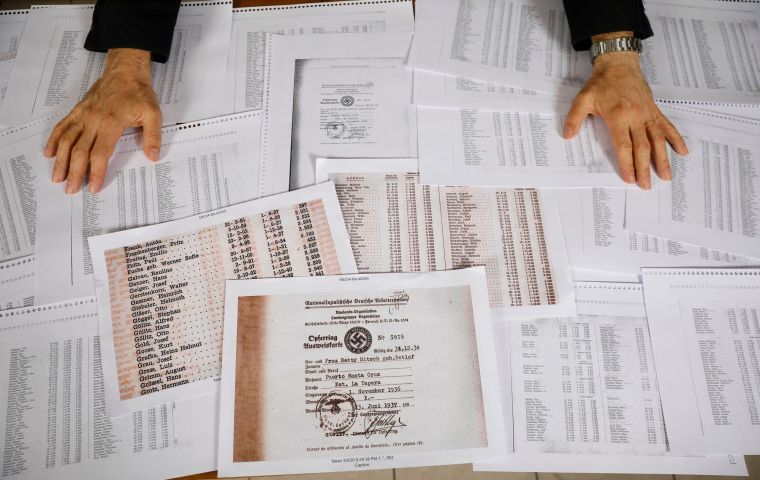MercoPress. South Atlantic News Agency
A list of 12.000 Nazis in Argentina with accounts in Credit Suisse has surfaced, confirms Simon Wiesenthal Center
 Nazi presence in Argentina is well documented, and dates back to the pro-Nazi regimes of Argentine president José Félix Uriburu and Agustín Pedro Justo.
Nazi presence in Argentina is well documented, and dates back to the pro-Nazi regimes of Argentine president José Félix Uriburu and Agustín Pedro Justo.  Nazi presence in Argentina is well documented, and dates back to the pro-Nazi regimes of Argentine president José Félix Uriburu (in picture) and Agustín Pedro Justo.
Nazi presence in Argentina is well documented, and dates back to the pro-Nazi regimes of Argentine president José Félix Uriburu (in picture) and Agustín Pedro Justo.  The list of Nazis based in Argentina included several account holders of funds that were sent to Credit Suisse, known then as Schweizerische Kreditanstalt.
The list of Nazis based in Argentina included several account holders of funds that were sent to Credit Suisse, known then as Schweizerische Kreditanstalt. A research by Argentine investigator Pedro Filipuzzi revealed a list of 12,000 Nazis in Argentina that apparently have money in accounts at the Zurich-based Credit Suisse investment bank, the Simon Wiesenthal Center said in a statement.
The list, which Filipuzzi gave to Simon Wiesenthal Center's international relations director Dr. Shimon Samuels and Latin America director Dr. Ariel Gelblung, was found in an old storage room at the former Buenos Aires Nazi headquarters.
Nazi presence in Argentina is well documented, and dates back to the pro-Nazi regimes of Argentine president José Félix Uriburu and Agustín Pedro Justo. However, Justo's successor in 1938, Roberto Ortiz, did not share his predecessor's pro-Nazi sympathies, and established the “Special Commission to Research Anti-Argentine Activities” in an effort to root out Nazi influence in the country.
Until that point, there was an official number of German National Socialist Party Foreign Organization (NSDAP/AO) members based in the country, as well as 12,000 members supporting the German Union of Syndicates and a further 8,000 individuals linked to other Nazi organizations.
“These included such German companies as IG Farben [the company that supplied Zyklon-B gas that was used in concentration camps] and financial bodies such as the 'Banco Alemán Transatlántico' and the 'Banco Germánico de América del Sur,'” Samuels explained in the statement. “These two banks apparently served for Nazi transfers on the way to Switzerland.”
During a raid on the German Union of Syndicates, the special commission captured a complete cache of documents, which led to the lower chamber of the Argentine congress printing a report in the early 1940s regarding Nazi bank transfers from the country to Swiss-based banks. The list of Nazis based in Argentina included several account holders of funds that were sent to Credit Suisse, known then as Schweizerische Kreditanstalt.
According to Gelblung, the list included several names that were related to companies that the US and UK blacklisted during the Second World War due to being supportive of the Nazi regime.
However, when the fascist Pedro Pablo Ramirez Menchaca took over Argentina in 1943, the special commission was disbanded and their findings burnt, including the lists printed by the lower chamber. However, the list of 12,000 names ostensibly survived this purge.
“We believe very probable that these dormant accounts hold monies looted from Jewish victims, under the Nuremberg Aryanization laws of the 1930s,” the center said in a letter addressed to Credit Suisse vice president Christian Küng.
The center added that, “We are aware that you already have claimants as alleged heirs of Nazis in the list,” and requested access to the bank's archives in order to somehow settle the issue.
“Mr. Küng, in 1997, we organized a major conference in Geneva, together with Winterthur Insurance, on ‘Restitution: A Moral Debt to History,’” Samuels noted, according to the statement. “A few weeks before our conference, I received a telephone call from Credit Suisse, requesting to co-sponsor our gathering... In the spirit of the conference’s title, I asked for access to spoliated accounts for our expert researcher. There was no response.
“The current story and the remaining assets, arguably looted, of 12,000 Nazis will, we hope, be viewed differently, for the good name of Credit Suisse.”
The issue of transfers of Nazi money out of South America is the subject of numerous efforts by the center in order to properly give restitutions to the dwindling number of still-living Holocaust survivors. An ongoing investigation by the center focuses on the transfer of gold out of Venezuela, which may have originated from Zahngold, gold ingots made by the Nazis from golden teeth pulled from Jewish corpses in concentration camps prior to their cremation.
“From about 1997 to 1999, an independent committee chaired by Paul A. Volcker carried out an investigation of Credit Suisse and about 60 other Swiss banks, searching for accounts possibly or probably owned by victims of Nazi persecution,“ Credit Suisse wrote in a statement to The Jerusalem Post.
”The committee concluded that its investigation was ”unprecedented .. [and] and intensive and sustained effort by a large staff of forensic accountants [and] .. has provided as full and complete accounting of the status of the accounts in Switzerland of victims of Nazi persecution as is now reasonably feasible. Nonetheless, we will again look into this matter.”




Top Comments
Disclaimer & comment rulesCommenting for this story is now closed.
If you have a Facebook account, become a fan and comment on our Facebook Page!